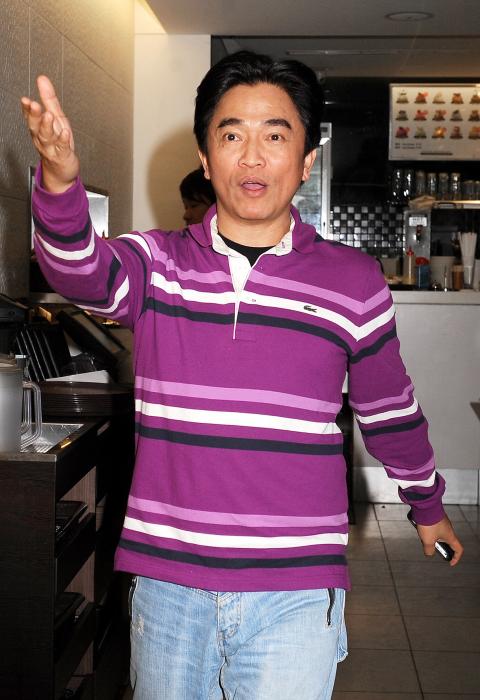Unlike many of her celebrity peers, Singaporean starlet Joanne Peh (白薇秀) has carefully cultivated a low-key, girl-next-door image.
The actress, who has said her favorite books include Pride and Prejudice and Great Expectations, will take the stage with other performers at the end of this month for the Thye Hua Kwan Charity Show, a televised fund-raiser for the Singapore-based Thye Hua Kwan Moral Society, whose services include providing free meals for the poor and counseling for gamblers.
At a press conference last week, held to plug the event, Peh told assembled media that she would perform a belly-dance routine in the hope of helping to raise the target amount of NT$90 million. Intelligent, community-minded and hard working: Will these qualities help Peh reach the big time? Only time will tell.

Photo: Taipei Times
Also stumping for a good cause last week was Taiwanese actress Annie Yi (伊能靜). She bared all at a press conference in Beijing last week for the US-based animal-rights group People for the Ethical Treatment of Animals (PETA) and declared that she would “rather go naked than wear fur,” our sister paper the Liberty Times reported.
A little digging under the surface, however, reveals that this is the same celebrity who bragged to the media in 2005 that she owned a closet full of fur coats — a statement she later retracted after receiving a barrage of criticism from animal rights groups.
Hitting the nail on the head, she told the assembled media: “I was once ignorant and loved the luxury and extravagance of fur. But now I understand that animals are tortured to make fur coats, so I’ll no longer wear them.”
While Yi is prepared to let it all hang out, Taiwanese singer-actor Jerry Yan (言承旭) is keeping his cards close to his chest. Returning from a meet and greet in Japan over the weekend, Yan was bombarded with questions by reporters who wanted to know if he had met up with rumored flame Lin Chi-ling (林志玲), who is in Japan filming the upcoming drama The 101th Proposal (101次求婚).
The reporters were particularly interested in Yan’s response as Lin’s father had recently dubbed him “the light of Taiwan” (台灣之光) because of his popularity and charity work. Yan ignored all the questions and was quickly bundled into a waiting car.
And finally, it’s official: funnyman Jackie Wu (吳宗憲) might be retiring from the entertainment business. At least that’s what he promised to do in the summer of last year if he were found guilty of fraud.
The Liberty Times reported that the accusation stemmed from a business deal with Hsu Fang-yang (許豐揚), who was suspected of misappropriating funds from his company to invest in Wu’s LED company.
At the time Wu, one of Taiwan’s most popular and highly paid entertainers, and who has been involved in several failed business ventures, had blubbered that he’d done nothing wrong and never lied to his fans.
Ah, but what a difference a year makes. Prosecutors met up with Wu on Tuesday for a chat because they suspect that he made several false transactions and had illegally pocketed NT$12.5 million.
They later indicted the variety show host, who now faces up to 10 years in jail.
Predictably, Wu told a press conference on Wednesday that prosecutors didn’t have all the facts and denied any wrongdoing.
“I definitely, definitely didn’t do anything illegal,” he said.
Perhaps Wu should seek some help from the Thye Hua Kwan Moral Society.

Towering high above Taiwan’s capital city at 508 meters, Taipei 101 dominates the skyline. The earthquake-proof skyscraper of steel and glass has captured the imagination of professional rock climber Alex Honnold for more than a decade. Tomorrow morning, he will climb it in his signature free solo style — without ropes or protective equipment. And Netflix will broadcast it — live. The event’s announcement has drawn both excitement and trepidation, as well as some concerns over the ethical implications of attempting such a high-risk endeavor on live broadcast. Many have questioned Honnold’s desire to continues his free-solo climbs now that he’s a

As Taiwan’s second most populous city, Taichung looms large in the electoral map. Taiwanese political commentators describe it — along with neighboring Changhua County — as Taiwan’s “swing states” (搖擺州), which is a curious direct borrowing from American election terminology. In the early post-Martial Law era, Taichung was referred to as a “desert of democracy” because while the Democratic Progressive Party (DPP) was winning elections in the north and south, Taichung remained staunchly loyal to the Chinese Nationalist Party (KMT). That changed over time, but in both Changhua and Taichung, the DPP still suffers from a “one-term curse,” with the

Jan. 26 to Feb. 1 Nearly 90 years after it was last recorded, the Basay language was taught in a classroom for the first time in September last year. Over the following three months, students learned its sounds along with the customs and folktales of the Ketagalan people, who once spoke it across northern Taiwan. Although each Ketagalan settlement had its own language, Basay functioned as a common trade language. By the late 19th century, it had largely fallen out of daily use as speakers shifted to Hoklo (commonly known as Taiwanese), surviving only in fragments remembered by the elderly. In

Lines between cop and criminal get murky in Joe Carnahan’s The Rip, a crime thriller set across one foggy Miami night, starring Matt Damon and Ben Affleck. Damon and Affleck, of course, are so closely associated with Boston — most recently they produced the 2024 heist movie The Instigators there — that a detour to South Florida puts them, a little awkwardly, in an entirely different movie landscape. This is Miami Vice territory or Elmore Leonard Land, not Southie or The Town. In The Rip, they play Miami narcotics officers who come upon a cartel stash house that Lt. Dane Dumars (Damon)